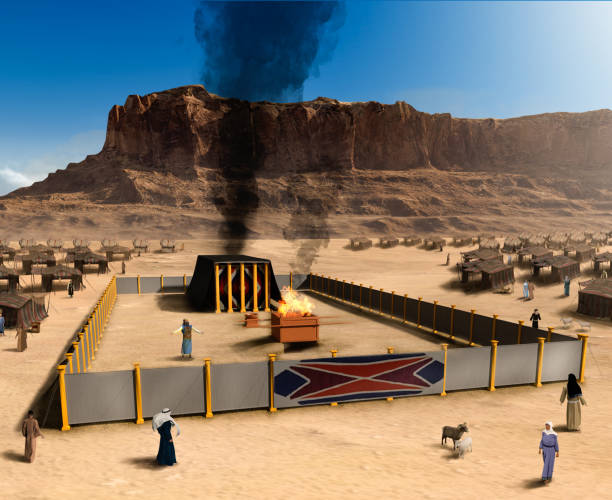The book of BeMidbar suffers of somewhat of an identity crisis. It is easy to determine the identity of the other books of the Torah. Genesis is about the creation and the life of the forefathers, Exodus is about the exodus and the tabernacle, Leviticus deal with the laws of the Levites and the Kohanim, and Deuteronomy, as its names suggest, is the repetition and review of law and history. But what is BeMidbar about? Numbers? Is it really the Book of Census, as it was known in Rabbinic literature, a travelogue, or a collection of unrelated of data, laws, and history?
I believe that BeMidbar’s story conveys an extremely important message to humanity:
BeMidbar starts with the description of a perfect society, with clearly drawn boundaries and set roles. The Israelite camp is presented as a center of holiness surrounded by concentric circles in descending order. The order is as follows: The Holy of Holies at the center; the Holy; the Tabernacle’s courtyard; the Levites and Aaron, in descending order: Aaron and family, Kehat, Gereshon, Merari; and finally, the Israelites. After the inner order the camp has been established, the Torah calls for spiritual and hygienic boundaries: lepers, people who suffer from sexually transmitted diseases, and those who were in contact with a corpse must leave the camp. Their exile is temporary, and each one of them must wait the symbolic seven-days period before rejoining the camp.
The Torah also singles out the deviate woman and the Nazirite as two extremes. The deviate woman lets herself be controlled by desire while the Nazirite decides to detach himself from society and abstain from wine. Both are not healthy, as one has to strike a balance between the pursuit of spirituality and enjoying life, so they are technically outside the camp. Between the two sections, the one which deals with lepers and those who suffer from spiritual contamination, and the one dealing with the Nazirite and the deviate woman, there is a paragraph which seems out of place. It speaks about paying back financial obligations, and also states that an unpaid obligation to another person is considered an offense towards God. Now, not only does this paragraph belong here, but is an excellent example of how the Torah considers transgression against others to be a religious offense. The Torah declares that in order to maintain the camp clean and holy, it is not enough to send away those we considered unholy because of diseases, but also those whose business ethics are flawed.
Following the clarification of boundaries and the cleansing of the camp, the divine blessing is bestowed upon the people, offerings are brought, the Tabernacle is inaugurated, and the Israelites start their first journey: ויסעו בראשונה על פי ה’ ביד משה – they traveled, for the first time as an organized camp, by the word of God, delivered through Moshe!
And it was a total disaster!
Within three days, the people complained for no reason, and then cried for food. Moshe was willing to quit his job, and when told by God that everyone is going to get meet, he appears to be incredulous. Two men prophesy without Moshe’s permission, Miriam and Aaron speak against Moshe, the scouts cause a rebellion… the list goes on and on.
This overview allows us to see how a perfect plan could fail if there are no committed individuals, who could carry it out, even at the price of their pride and sense of entitlement.
Since the events of beMidbar are intricately interwoven, I will expand more on the details of that message in the next segment, but meanwhile I would like to conclude with words from David Brooks, in his recent book, The Social Animal:
You can siphon money to poor areas, but unless a culture develops self-control, social mobility is unattainable. You can raise or lower taxes, but without trust and confidence, corporations and institutions will not form and people will not invest in each other. You can declare elections, but without responsible citizens, democracy will not flourish. Criminologist James Q. Wilson, who devoted his life to shaping and writing public policy, finally arrived at this fundamental truth: “…at the core, in almost every field of public engagement we seek to encourage people to act morally and ethically, whether we deal with students, people applying for government aid, potential criminals, voters, or elected representatives.”
The book of BeMidbar, in a quiet, unassuming manner, teaches us the same idea, as valid today as it was millennia ago in the desert.


















